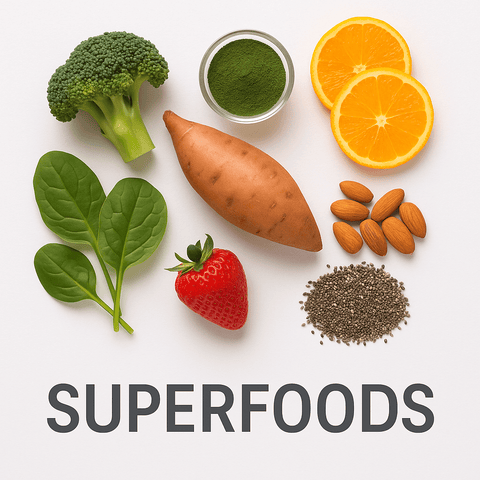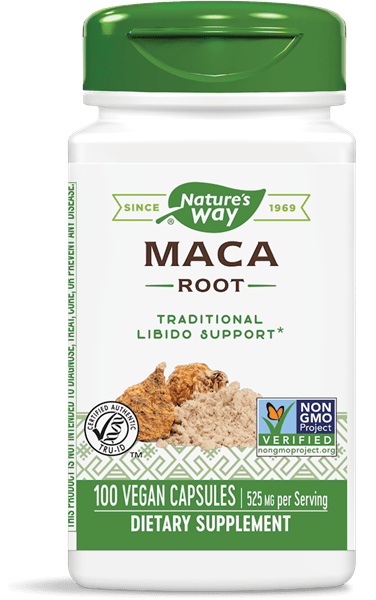
Superfoods Guide: Nutrient-Rich Foods
🥦 Superfoods Guide: Nutrient-Rich Foods
📚 Table of Contents
-
Introduction
-
Understanding “Superfoods”
-
Key Nutrients in Superfoods with EFSA-Approved Claims
-
Vitamin A
-
Vitamin C
-
Vitamin E
-
Vitamin D
-
Vitamin K
-
B Vitamins
-
Calcium
-
Iron
-
Zinc
-
Selenium
-
Iodine
-
Omega-3 Fatty Acids (ALA)
-
-
Top Superfoods and Their EFSA-Approved Benefits
-
Carrots, Sweet Potatoes & Leafy Greens
-
Citrus Fruits & Berries
-
Nuts, Seeds, Olive Oil
-
Fatty Fish & Algal Oils
-
Dairy & Fortified Alternatives
-
Legumes & Whole Grains
-
Seaweed & Algae
-
-
Portion Guidance and Dietary Tips
-
Combining Superfoods Strategically
-
Safety, Interactions & Balance
-
FAQs
-
Conclusion
1. 📖 Introduction
The term “superfood” has become popular in nutrition circles—but what does it really mean? Typically, a superfood refers to nutrient-dense items with high concentrations of vitamins, minerals, or beneficial fats.
This guide explores a range of superfoods—like berries, leafy greens, nuts, fatty fish, and seaweed—only using EFSA-approved health claims tied to their key nutrients. That ensures credible, science-based messaging.
2. 🔍 Understanding “Superfoods”
The word “superfood” isn’t a legal or scientific term in the EU. Instead, foods earn that title because they deliver substantial levels of essential nutrients in small servings.
To stay compliant with EFSA, we highlight the nutrients inside superfoods—such as vitamins A, C, D, E, K; minerals like calcium, iron, zinc, selenium, iodine; omega‑3 fats—each with approved health claims linking to functions like immunity, vision, energy metabolism, antioxidant protection, and more.
3. 🧠 Key Nutrients in Superfoods with EFSA-Approved Health Claims
Here’s a breakdown of relevant nutrients and their EFSA-approved benefits:
Vitamin A
-
Contributes to normal vision, immune function, skin & mucous membranes, cell specialization, and embryonic development
Vitamin C
-
Supports immune function, collagen formation (skin, gum, teeth), iron absorption, energy metabolism, psychological function, reduction of tiredness, and antioxidant protection
Vitamin E
-
Protects cells from oxidative stress
Vitamin D
-
Aids immune health, muscle function, bone & teeth maintenance, calcium/phosphorus absorption, and cell division
Vitamin K
-
Supports blood clotting and bone maintenance
B Vitamins (B1–B12)
-
Support energy-yielding metabolism, nervous system, psychological function, red blood cell formation, skin & mucous membranes, metabolism of macronutrients, DNA synthesis, and more
Calcium
-
Supports bones, teeth, muscle function, energy metabolism, neurotransmission, digestive enzymes, and cell division
Iron
-
Supports oxygen transport, red blood cell formation, cognitive function, energy metabolism, immune function, and reducing fatigue
Zinc
-
Supports immunity, DNA synthesis, cognitive function, vision, skin/hair/nails, vitamin A metabolism, testosterone levels, oxidative stress protection, and macronutrient metabolism
Selenium
-
Supports immune and thyroid function, sperm formation, hair/nail maintenance, and antioxidant protection
Iodine
-
Supports thyroid hormone production, energy metabolism, nervous and cognitive function, and growth
Omega-3 Fatty Acids (ALA)
-
EFSA permits the claim “ALA contributes to the maintenance of normal blood cholesterol levels.”
4. 🌟 Top Superfoods and Their EFSA-Approved Benefits
🍠 Leafy Greens & Orange Veggies
-
Carrots, sweet potatoes, spinach, kale are rich in provitamin A, contributing to normal vision, immune function, and cell growth
🍊 Citrus Fruits & Berries
-
Oranges, strawberries, kiwi, rosehips provide Vitamin C for immune function, collagen, iron absorption, antioxidant defense, energy, and psychological wellness
🥜 Nuts, Seeds & Olive Oil
-
Sources of vitamin E (sunflower seeds, almonds) and ALA (flaxseed, chia), both supporting antioxidant protection and normal cholesterol levels
🐟 Fatty Fish & Algae Oils
-
Provide vitamin D (supports bones, muscles, immunity) and ALA/ALA’s benefits on blood lipids
🥛 Dairy & Fortified Alternatives
-
Offer calcium, often paired with vitamin D, supporting bones, muscles, teeth, metabolism, and neurotransmission
🌾 Legumes & Whole Grains
-
Source of B vitamins, iron, and zinc, with proven roles in energy, blood health, DNA, immunity, and overall metabolism
🌿 Seaweed & Algae
-
Contain iodine (thyroid, cognition, growth), calcium, and B vitamins
5. 🍽 Portion Guidance and Dietary Tips
-
Leafy greens: Aim for at least 200 g/week to meet vitamin K, A and folate needs
-
Citrus/berries: 1–2 portions daily covers vitamin C needs
-
Nuts & seeds: A small handful (30 g) daily for vitamin E and omega‑3 ALA
-
Fatty fish: 1–2 portions/week to supply vitamin D and omega‑3 ALA
-
Dairy or fortified milks: 200–300 ml/day for calcium and vitamin D
-
Whole grains & legumes: 3–5 servings daily for B‑vitamins, iron, zinc
-
Seaweed: Occasionally to boost iodine intake—1 g dried can provide RI
Pairing strategies:
-
Vitamin C + iron-rich plant foods enhances non-heme iron absorption
-
Fat-soluble vitamins A/D/E/K best absorbed with healthy fats
-
Combine calcium + vitamin D sources together
6. 🔗 Combining Superfoods Strategically
Choose synergistic combinations in meals:
-
Oat porridge topped with berries (vitamins C, A, B)
-
Spinach salad with orange segments, almonds, olive oil (A, C, E, K, B vitamins)
-
Salmon with steamed broccoli and quinoa (D, omega‑3, calcium, B, iron, zinc)
-
Fortified plant milk smoothie with banana and flaxseed (D, calcium, B, ALA)
This ensures overlapping coverage of EFSA-approved nutrient functions.
7. ⚠ Safety, Interactions & Balance
All superfoods are safe in normal dietary amounts. Key considerations:
-
Limit seaweed consumption to avoid excessive iodine
-
Nuts/seeds are calorie-rich, so moderate intake for weight-conscious individuals
-
Over-reliance on fortified foods or supplements can risk exceeding tolerable upper limits (e.g., vitamin A, selenium, zinc)
-
Diet diversity remains the best way to obtain nutrients naturally
8. ❓ FAQs
Q: Are superfoods scientifically proven?
Superfoods are nutrient-rich foods. We base advice on EFSA-approved claims tied to their vitamins/minerals (like vitamin C for immune function, vitamin A for vision, omega‑3 ALA for cholesterol).
Q: Can superfoods replace supplements?
Diverse whole foods often provide sufficient nutrients. Supplements may be needed in certain cases (e.g., low sunlight for vitamin D).
Q: How often should I eat superfoods?
Include a variety daily: fruits, greens, nuts/seeds, whole grains, fish/dairy. Seaweed a few times weekly, nuts seeds daily, citrus & berries often.
Q: What's the healthiest breakfast?
Porridge + berries + nuts + fortified milk = vitamins C, B, A, calcium, B‑vitamins, omega‑3 ALA.
Q: Can “superfoods” cause imbalances?
Only in extreme excess. Keep diet varied—rotating sources and mindful serving sizes prevents nutrient overload.
9. ✅ Conclusion
Superfoods can be powerful allies when you base choices on EFSA-approved health claims. By focusing on:
-
Leafy greens & orange veggies (vitamin A, K)
-
Citrus & berries (vitamin C)
-
Nuts & seeds (vitamin E, omega‑3 ALA)
-
Fatty fish/fish oils (vitamin D, omega‑3)
-
Dairy/fortified alternatives (calcium, vitamin D)
-
Whole grains & legumes (B vitamins, iron, zinc)
-
Seaweed (iodine)
…you build a nutrient-dense diet that supports immunity, vision, bone/muscle health, energy, metabolism, and cellular protection—within the rigor of EU regulations.
Use this guide as a foundation to design balanced, nutritious meals around foods validated by official health claims—no hype, just science.

